- Home
- Carl Deuker
Runner Page 3
Runner Read online
Page 3
I had six hours to kill before I could flick off the lights and call it a day. I waited until it was almost seven before I heated up a can of tomato soup and made a grilled cheese sandwich. After I'd cleaned the dishes and put them away, I watched Fear Factor and Cops on TV. When that got too stupid, I switched off the television and turned on the radio. There are kids at school who live for music; I wish I were that way. I wish I could find some station that would make an hour or two or three go by, but I can't.
Around nine o'clock I left the boat and walked the length of the marina. I like to walk after it gets dark because it's quiet then. The sidewalks are empty and the nightclubs haven't gotten going.
It was after eleven when I finally climbed into my berth, and my dad was still out drinking. The wind was up, making the boat rock back and forth, and my mind would rock back and forth with it. One minute I'd want him to disappear from my life forever; the next I'd panic at the thought of being alone in the world.
I don't know when I finally fell asleep. When the alarm went off at six-thirty, my dad was snoring away in his berth. I didn't know whether I was glad to see him there, or whether I wished he hadn't come back.
I closed my eyes and lay back. I thought about skipping school, but if I did I'd end up hanging around the boat waiting for him to start drinking. So at seven-fifteen I was dragging myself up Sixty-first toward Lincoln High.
CHAPTER ELEVEN
Sixty-first crosses under the railroad tracks before it climbs the bluff into Ballard. Homeless guys sleep behind the blackberry bushes that grow along the tracks. Most of the time I just hear them rustling around back there, but sometimes they come out and ask for money or cigarettes.
The guy who came out that morning had a skinny, wrinkled face, blue eyes, and long, black hair. "You got a spare quarter, kid?" he said, his voice raspy.
"I got nothing," I said.
I tried to edge around him, but he stepped in front of me.
"Have a heart, kid," he said. "A quarter? A dime? You got to have something."
"I told you," I snapped. "I got nothing."
As I moved by him, he grabbed at my sleeve. I wheeled around and pushed him away. His chest felt small and bony, like a child's. He toppled in a heap onto the sidewalk.
"All I wanted was a quarter," he called after me. "You didn't have to hit me, you son of a bitch."
It wasn't until I'd reached the top of the hill that I looked back. The guy was sitting on the sidewalk, looking up at me. "You son of a bitch," he called out again, but his voice was so weak I could hardly hear him. I kept going.
It's straight uphill from the marina to Thirty-second Avenue, but there the land levels. Walter's Café is on Thirty-second, right at the top of the hill. Kim Lawton—a friend of my mom's from before the divorce—works there. She's always after me to stop in to see her, but I don't, partly because I don't have much money and partly because she reminds me of my mother. But the whole thing with the homeless bum made my hands shaky and my knees feel like they were made of water. A cup of something hot didn't seem like the worst idea.
Kim was behind the counter. The instant she saw me, her face broke into a big grin. "Good to see you, stranger," she said as I stepped inside. "And it's about time, too."
I ordered a small hot chocolate and put six quarters down on the counter. She pushed the coins back to me. "Go sit down," she said. "I'll bring it to you."
I found an empty table in the corner. I hadn't waited for more than a minute before Kim put a mug of hot chocolate on the table and settled into the chair across from me. "How are things going, Chance?" she said.
"OK."
"What's OK mean?"
"OK means OK. Not good, not bad."
She pursed her lips, and I could tell we were both thinking about my mom. Just then an old guy came in. Kim jumped up and returned to her spot behind the counter. "The regular?" she asked.
The old guy nodded, and soon the café filled with the sound of the espresso machine. My chocolate was too hot to drink quickly, so I put my hands around the mug and let the warmth in, taking a sip every now and then.
I thought that sitting would steady my nerves; instead, it made things worse. I kept seeing the homeless guy sprawled out on the sidewalk. I kept feeling his bony chest against my palms. He was the size of a child and I'd pushed him hard. What if I'd hurt him badly? What if he was still down on the sidewalk?
More customers came in. Kim looked over at me, shrugged, and I gave her a wave to show I understood. Eventually I finished my hot chocolate and then headed for the door. "You leaving?" Kim called to me. She had a line of customers now.
"I've got school," I said.
"Come in Saturday when it's not so busy," she said. "I want to have a long talk with you."
"I will," I said.
I pushed the door open, but instead of going to school, I retraced my steps to the top of the hill and looked down the street to where the homeless guy had fallen. He wasn't there. I wanted to believe that meant everything was OK, but I couldn't. He might have crawled into the bushes. If he did, and he was hurt and alone, he could die in there and nobody would find him for weeks.
I walked slowly down to the bottom of the hill. When I reached the spot where he'd fallen, I stepped off the sidewalk and pushed my way through the tangle of blackberry bushes. "Anybody in here?" I called out.
There was no answer.
"Is somebody in here?"
Still no answer.
I followed a hint of a trail about twenty more feet, ducked under some vines, and found myself in a small clearing. Under a makeshift tent made of plastic bags were some cans of food, a pair of boots, an old coat, a sleeping bag, empty beer bottles, and a bunch of old magazines. Sitting on the ground next to that pile of junk were two guys—the guy I'd pushed and another guy who was older, skinnier, and had a long, gray beard. They were both smoking cigarettes.
"You OK?" I said, looking at the guy I'd pushed. He just stared at me. "You OK?" I repeated. He kept staring.
I reached into my pocket, pulled out the quarters that Kim Lawton hadn't taken, and held them out to him. He stuck his hand out. There was an open sore on his palm, and his hand was filthy. I placed the coins into his hand and he shut his fingers tightly around them.
"I'm sorry," I said. "I didn't mean to hurt you." Then I turned and got of there as fast as I could.
CHAPTER TWELVE
By the time I reached Lincoln High that morning, I'd missed all of first and half of second period. Mrs. Spiel-man, the attendance secretary, chewed me out. "You can't get credits if you cut classes," she said as she wrote out my pass.
"I haven't cut many classes," I said. "Besides, school has only been going a couple of weeks."
"Well begun is half done, and don't forget it."
All morning I sat in the back of whatever class I was in and tuned out everything. During lunch I went to the commons area, bought a Coke out of the machine, sat in a corner, and drank it.
I tried to tune out everything there too, but three girls came and sat at the same table. They'd talk a little, and then start laughing so hard their heads bobbed up and down. Then they'd talk some more, and then they'd laugh again. Just before the lunch period ended, I spotted Melissa Watts. She was talking to Rachel Miller, another girl in Arnold's class. I kept hoping she'd look over and see me, but she didn't, and then the lunch period ended.
I thought about cutting my afternoon classes. The Tiny Dancer would probably be empty. My dad might be looking for a job, although it was more likely he was out looking for a drink. But what would I do when I got to the boat? Cutting school would just make the day longer.
So when sixth period rolled around, I was sitting in my normal place in the last chair in the last row in Mr. Arnold's class. The starlings were still attacking the bugs in the lawn, and Arnold still wanted to talk about terrorism and Iraq and all that crap.
I've got to give it to Arnold. The guy worked hard to make class interesting. But withou
t Brent Miller in uniform right in the front of the class, kids didn't pay attention. Heather Carp was picking nail polish off her fingernails; Melody Turner was doodling in her notebook.
Class ended with Arnold and Melissa arguing about countries I couldn't have found on a map and leaders whose names I couldn't begin to spell. A couple of times Melissa would look back at me, but I couldn't make myself care about Singapore or Indonesia. All I could think about was the moorage fee, the electric bill, the heating bill, the sewage fee, the food bills—and how we didn't have money to pay any of them.
When I reached my locker, Melissa was waiting for me. "Why didn't you say anything? You just sat there all through class."
Her eyes were both angry and disappointed. How could I explain? She lived in a big house overlooking Puget Sound. She drove a brand-new blue Jetta, wore hundred-dollar shoes and hundred-dollar pants and hundred-dollar shirts.
I closed my locker. "I've got to go," I said. "I'll see you tomorrow." Before she could say anything else, I walked away.
CHAPTER THIRTEEN
Ever since I turned fifteen I've worked weekends washing pots at Ray's restaurant, a fancy fish place right down from Pier B, from two to ten. It's hot, sweaty work. The water is almost boiling, the garbage cans stink of fish guts, and I have to hunch over the whole time. The only good thing about the job is the money, and there isn't much of that.
My boss is Jeff Creager, a big guy with a big voice who is always worked up about something. Everybody stays clear of him if they can. When I stepped into the kitchen the Saturday after my dad got fired, Creager was by the grill, arguing with the chef, Carl Thorgenson. Instead of going to the sink, I went over to Creager. "I've got to talk to you," I said.
"Not now," he snapped, and he started going on about some salmon recipe Thorgenson wanted to use. I stood listening to them yell at each other about how much pepper was too much, wondering if they'd ever stop. The other kitchen- help guys were peeling potatoes or chopping lettuce, all the time sneaking peeks over at me, wondering what I was doing.
Finally Creager stopped for a moment and glared at me. "Didn't I tell you to get to work?"
"I've got to talk to you," I said.
"This better be important," he said.
My throat went dry. I licked my lips and then swallowed. "I need more hours," I said.
He laughed sarcastically, and then motioned to the entire work crew. "You hear him? He says he needs more hours. Well, I'll tell you and I'll tell everyone. I've got no more hours to give."
"You don't understand, Mr. Creager," I said. "I've—"
"I do understand," he said, interrupting. "Your old man lost that job over at Sunset West. I heard about it. It's a tough break for you. But this isn't a church, Chance. This is a business, and right now business isn't good. You're lucky to have the hours you've got. So put on your apron and get busy."
I did what he said, and for the rest of that afternoon I stopped thinking about anything but the greasy pots and the hot water and the steam—and how much I hated them all. When my shift ended, I was too tired to worry about money or my father or anything. I just went back to the boat and slept.
You can't think about something all the time, no matter how important it is. For the next few weeks my mind would go back and forth between long periods of a vague drifting and short times of intense focus. When my mind was drifting, my dad's drinking, the moorage fees, school—none of it seemed to matter much. The blood in my body and the thoughts in my brain moved slowly like a wide river close to the ocean. But every once in a while I'd snap out of that state and everything would seem as sharp as if it were under a microscope. Sometimes all I could think about was money. I'd look around and it seemed like every kid but me had it. Money for cars, money for clothes, money for movies, money for CD players, money for cell phones. Walking home after school I'd watch the Lexuses and the Mercedes pull out of the parking lot, the owners hidden behind tinted glass. I'd look at the houses on Sunset Hill with their fancy landscaping and their statues and fountains. All of it cost money, lots of money, money that all these people had. How could money be so easy to get for some people and so hard for others?
When the end of the month finally came, I told myself that I wasn't going to ask my dad about the moorage fee. There was no point, because I knew the answer. But when I got back to the boat in the afternoon and saw him sitting topside smoking a cigarette and reading the newspaper like some retired rich guy, I couldn't stop myself. "Did you pay the moorage fee?" I said as soon as I stepped onto the boat.
He looked up from the newspaper. "What?"
"The moorage fee," I repeated. "It's due today. Did you pay it?"
"Don't worry about the moorage fee, Chance. They can't touch us for three months. It's the law. By then I'll have a job."
"What if you don't get a job?"
"I will get a job."
"Can you get unemployment compensation?"
"No. I can't get it. My job wasn't that kind of job. And I can't get welfare anymore either."
"So what are we going to do?"
"I told you. I'm going to get a job."
He held the newspaper up in front of him so that I couldn't see his face. I went down below, shoved my backpack under the navigation table, and made myself a cheese sandwich. As I was eating, he leaned down into the companionway. "I'm going out," he said. "I'll be back later."
When I finished the sandwich, I sat at the table thinking. Three months. It wasn't long. What would we do then? Sell the boat? Who'd buy it? There had to be twenty boats for sale in the marina in better shape than the Tiny Dancer. Besides, without the boat, where would we live?
I ran that day, but instead of going through the locks and up into Magnolia, I kept going on Market until I reached Little City Hall. I pushed around some brochures on a table, hoping to spot what I was looking for. Behind the counter was a guy with long hair and a beard. "Can I help you find something?" he said.
"There's this family I know that doesn't have much money. I was thinking they might be eligible for food stamps. Is there some sort of application form?"
"It's right there," he said. "Right where you're looking. In green."
I picked up the form. "Thanks," I said, folding it and putting it in my back pocket. "I'll bring this to them."
I ran back to the marina, the whole time feeling stupid for lying. The guy had seen right through me. After I showered, I went back to the boat, sat down at the navigation table, and filled out the food stamp application. Then I addressed an envelope, stuck a stamp on it, and put it on the table where my dad would see it. The only thing left for him to do was write down his social security number, sign it, and drop it in the mail. But even as I left it there, I knew he never would.
CHAPTER FOURTEEN
That Saturday I slept in for as long as I could, ate a little breakfast, and killed the rest of the morning watching television. In the afternoon I headed for my job at Ray's.
Eight hours later, tired and sweaty, I made my way back to the empty boat. They gave me a free dinner at work, but I was hungry again, so I heated up a frozen pizza, turned on the television, and watched an old movie about gamblers that was supposed to be funny but wasn't.
The movie ended at twelve-thirty. I flicked off the television, crawled into my berth, and fell asleep. I woke up around three in the morning. Immediately I recognized the sound that had awakened me: my dad was walking back and forth on the deck.
I looked out the small, rectangular window. It was raining, and the wind was blowing. I lay on my back for a minute hoping he'd come down. Finally I threw the blankets back, pulled my coat on, and climbed to the top stair. "What are you doing, Dad?" I said, leaning my head out. "You're going to get sick."
He stopped pacing and looked at me. "Wouldn't it be something to be out sailing tonight, Chance? Wouldn't it?"
"You're going to get sick," I repeated. "Come down below."
He looked up at the sky and then he looked at me. "I'm going t
o get a job, Chance. You don't believe me, and I don't blame you, but I will. And I'm going to sail this boat someday too. You wait and see if I don't."
He'd been drunk that night, but on Sunday afternoon he got a haircut and on Sunday night he did a couple of loads of wash. All that week he was up before me. By the time I crawled out of my berth, he'd already shaved, combed his hair, and put on his best shirt and pants. When I came back from running in the afternoon, he'd be at the table in the cabin circling ads in the help-wanted section of the Seattle Times.
Wednesday night the fat guy from the marina office came down onto the pier. "You've got a phone call," he called to my dad. "Salmon Bay Gravel."
My dad hustled up the pier to the office. When he came back, he didn't say anything, so I asked. "What was that about?"
"I've got an interview tomorrow. Cement work."
About a hundred questions popped into my head, but I knew to keep my mouth shut. He wouldn't want to talk until he actually had the job, and I didn't blame him.
Thursday morning he shaved, and then shaved again. He took my math book and used it to smooth out some of the creases on his gray shirt. "You look fine, Dad," I told him. "You really do."
All day at school I kept thinking of him at that interview. I couldn't figure how it could go wrong. He hadn't had a drink all week. And when he wasn't drinking, my dad was an OK guy and a good, hard worker. Besides, it wasn't like he was applying to be a brain surgeon.
When school ended, I hurried back to the marina. As soon as I stepped onto the boat, I called out for him. "You here, Dad?" I said, climbing down into the cabin. On the table sat an empty bottle of beer. In the trash were a half dozen more.
It made me angry. OK, my dad drank. OK, he didn't have any great work record. But he was good enough to fight in Kuwait. Why couldn't he catch a break just one time?
I was angry all the next day at school, which is probably why I ended up shooting off my mouth in Arnold's class. All week he'd been having us read famous speeches. Some I'd heard of, like Martin Luther King Jr.'s "I Have a Dream" speech, and Kennedy's Inaugural Address. Others, like Pericles' Funeral Oration, were new to me.

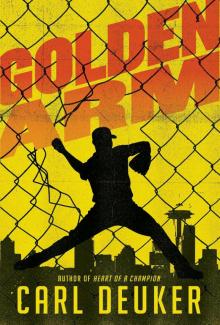 Golden Arm
Golden Arm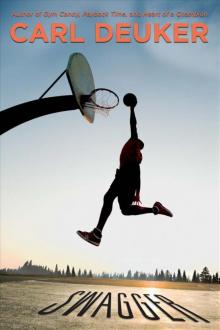 Swagger
Swagger Gym Candy
Gym Candy Night Hoops
Night Hoops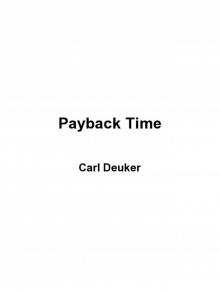 Payback Time
Payback Time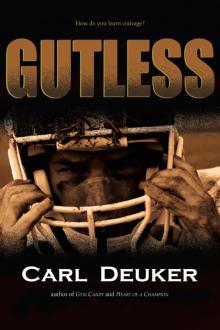 Gutless
Gutless Runner
Runner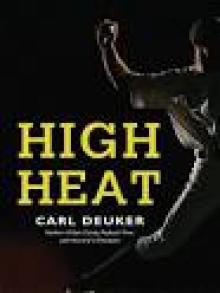 High Heat
High Heat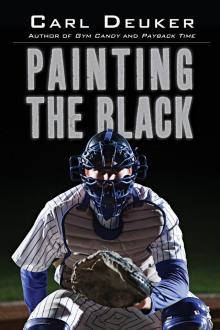 Painting the Black
Painting the Black